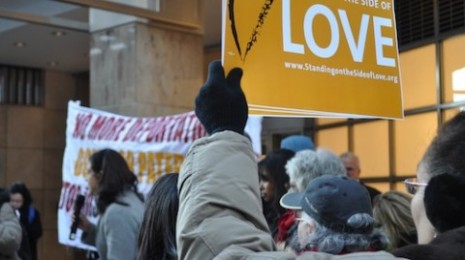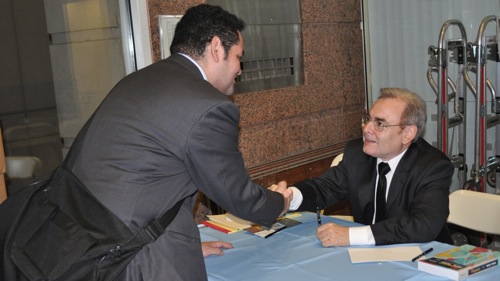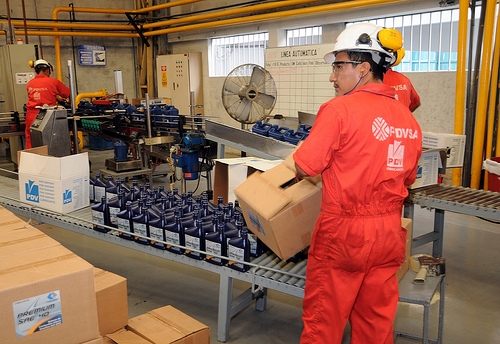
Dispatches, Southern Cone, Uruguay
Uruguay’s Growing Economy Stimulates Reverse Migration
May 25, 2011 By Mariana Bueno
Despite the adversity of being an undocumented immigrant in The United States, López found a job in New Jersey three days after his arrival. During his nine years in the United States, López climbed his way up from being a dishwasher to a head chef of a Brazilian restaurant.
“Making money in America is easy,” he said. But López’s inability to alter his status as an undocumented immigrant and the fear of deportation helped trigger his decision to return home.
Thirty Uruguayans per month are deported from the United States, according to Uruguay’s Office of Welcome and Returns (OWAR, in Spanish).
“I knew people in New Jersey that were deported. [ICE] doesn’t give you a break, they take you and send you home with what you wear,” López added.
Although fewer Uruguayans are deported from Spain, many Uruguayans return home due to Spain’s now high level of unemployment.
Initially working under the table, González obtained his first official Spanish job contract a year later, which allowed him to remain in the country legally. González had wanted to work as a lifeguard like he did in Uruguay, but the immediate need for a contract forced him to be less selective.
In 2007, González finally acquired his permanent residency and began work as a lifeguard at a prestigious health club. Yet last year, in spite of the progress he had achieved in Spain, he started to plan his return to Uruguay — prompted by the birth of his first child.
“We always knew we wanted to raise our baby in Uruguay, surrounded by our family,” González said.
One of the main factors pushing Uruguayans to return home is the country’s new economic climate. The Uruguayan economy grew 8.5 per cent in 2010 and reached the lowest unemployment level since 1986, attracting foreign direct investment and expanding the national job market.
According to the latest report from the United Nations Economic Commission for Latin America and the Caribbean, foreign direct investment jumped 29 percent in 2010 in comparison to 2009. Uruguay received a total of $1.6 billion investment dollars last year.
The Uruguayan government estimates that 4,200 Uruguayans will move back home during 2011. In a recent press conference, Jorge Muiño, Assistant Director of Consular Affairs and Liaison for Uruguay, said that approximately 350 Uruguayans returned home in March 2011.
The flow of immigrants from overseas has led the Uruguayan government to create new polices to absorb the newcomers into society and provide them with support.
In 2008, Uruguay opened the OWAR to provide information and resources to newcomers. OWAR recently published a manual for those returning, compiling information on programs and benefits that are available to the newcomers. Programs range from shipping your household items to health coverage and housing.
Ana María Sosa of OWAR observed that newly relocated Uruguayans are mainly concerned with finding a home, a job, and health coverage. OWAR helps facilitate the necessary paperwork for a year of free family medical insurance, and even acts as a guarantor for eligible returning immigrants looking to rent a house.
Andrés Peláez, Director of Consular Affairs and Liaison for Uruguay explains that in many cases, Uruguayan embassies lend money for airfare.
Still, not every Uruguayan returns home in an economically vulnerable situation. Many return immigrants are simply drawn by the good economy and the desire to raise their children or retire in their native home. According to Peláez, the typical return immigrants “are adults over 35 and as old as 50 or 55 years old with family, and the needs they have when returning are varied, depending on the situation in which they return.”
After returning home to Uruguay, both González and López had to adjust to life back in their country of origin. González said he found Uruguay a bit dirty and unsafe, and confessed he missed Spain more than his girlfriend did.
“I guess it’s normal to miss a place in which you lived many years and have nice memories,” González said, referring to Spain. Although González has inherited a house in Uruguay and brought all his belongings, including his car, back from abroad, he is struggling to find a job comparable to the one he left in Spain.
López, on the other hand, is happily working as a cook in a restaurant near his mother’s home. After three months in Uruguay, he acknowledged that he has to manage his money more efficiently than in the United States, but he says being with his family is priceless.
“Sometimes I think about how sad and lonely my life was in New Jersey,” said López. “My life was limited to home and work, and with my spare time I spent hours on Skype, talking with my family.”
Photo: bruckerrlb @ Flickr.





